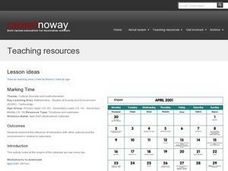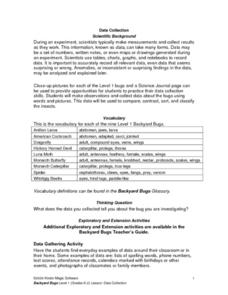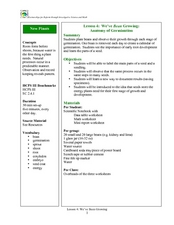Curated OER
The Counting Caterpillar
A daily counting routine builds a caterpillar with 100 body segments (marked with symbols to indicate 2s, 5s, and 10s) by the 100th day of school. Provides structured repetition as part of the morning routine so that by 100th day,...
Curated OER
Telling Time as an Everyday Use of Numbers
How can we estimate time? Have your young mathematicians make a clock. Then they compare and contrast types of clocks. They practice writing times in two different ways and make a book about telling time.
Curated OER
How Many Months?
Students investigate the first Peter the Mint Eagle, who lived at the Philadelphia Mint from 1830 to 1836. They determine how many months Peter was there and use pictures, numbers, equations, and/or words to explain how they came up with...
Curated OER
Double Your Money
What a creative way to delve into adding large numbers! After listening to a story called The King's Chessboard, learners estimate how much money they would have each day following instructions based on doubling and exponentially...
Curated OER
Discovering Pi
Define terminology related to a circle. Practice accuracy in measuring and then create a spreadsheet based on data collected from solving for parts of a circle. Groups can have fun analyzing their data as it relates to Pi.
Curated OER
Draw an Inch, Walk a Mile
Students work in small groups to solve the problems presented. The main project, mapping the classroom, use these discussions to collaborate in creating a tangible demonstration of their understanding.
Curated OER
History of Toys and Games
Students research history of popular toys to learn when those toys were first introduced. They use measurement skills to create an accurate timeline.
Curated OER
Quel temps fait-il?
Hit all the basics with this lesson, focusing on weather, greetings, and dates! Start by singing a weather related song ("Quel temps fait-il by Barbara MacArthur is suggested), and then read a story about getting ready for school. The...
Curated OER
What Day Is Missing?
In this days of the week worksheet, 1st graders cut out 7 cards with the days of the week and paste them in the proper space in a chart.
Curated OER
Numbers Beyond Reason!
Fourth graders use the story of the discovery of irrational numbers to explore the different classes of numbers, the different ways in which numbers may be represented, and how to classify different numbers into their particular class.
Curated OER
Another Backpack Idea- The Button Bag
Students receive activity bags to bring home and share with their families. They are excited to have "homework" and they accomplish several skills by completing the activities within the bags. This is great for special needs students.
Curated OER
One-to-one Correspondence
Young scholars count and keep track of objects using one-to-one correspondence. By moving, touching and pointing to objects they organize counting to determine the number in a set accurately. This helps students to practice the skill of...
Curated OER
Participants are challenged to create several different sorting groups for the set of images.
Young scholars examine the influence of interaction with other cultures and the environment in relation to calendars. They also look at the origins of the calendar we use every day.
Curated OER
Late-In-The-Year Counting
Students practice forward and backward counting. For this counting lesson, students calculate how many objects in a bag by counting forward and then count backward to check.
Curated OER
What Did I Learn Today?
Pupils are given a calender to take home and show their parents what they learned during the day. They write sentences and draw pictures for their calendar. They are able to keep their parents aware of what is happening at school.
Curated OER
The Achievements and Challenges of Guatemala
Students research the Mayan number and calendar system. They translate a variety of math problems from base-10 Arabic numbers into a base-20 Mayan representation. They discuss current challenges faced by the people in today's Guatemala.
Curated OER
Finding the Flu
Young scholars work to determine when the flu is most prevalent in the United States. They gather data on their own, create calendar, charts, and graphs, analyze their findings and present them. This is a very appropriate winter activity!
Curated OER
Mathematicians and Scientists Treasure Hunt
Students match a fact with a mathematician or scientist using the Internet. They read about a mathematician or scientist that happens to be female or a person of color.
Curated OER
Filling the Time
Students predict what sort of activities can be accomplished during the allotted time. In this time lesson, students record their predictions and perform the activities they predicted that they could accomplish within the 20 minute time...
Curated OER
Budgeting 101
Students identify various sources of income and discern between needs and wants as they also learn to create a personal budget. In this personal budget lesson, student understand financial scenarios as they relate to different ways...
Curated OER
Science: Backyard Bugs Data Collection
Young scholars practice data collection skills by observing common bugs found in their local environment. Once the data is collected they complete data sheets to compare, contrast, sort, and classify the insects. The lesson includes...
Curated OER
Come On Over To Maya Place
Fifth graders analyze the Mayan culture. In this Mayan culture lesson, 5th graders study the Mayan culture noting similarities and differences between the Mayan culture and their own. Students examine hieroglyphic writing and the Mayan...
Curated OER
Egyptian Hireroglyphs
Fifth graders identify the aspects of Ancient Egyptians and Heiroglyphs. They compare and contrast Egyptian Hieroglyphs with the decimal number system. Students recognize the decimal number system and compares to bases other than ten.
Curated OER
We’ve Bean Growing: Anatomy of Germination
Students identify the main parts of a seed. In this biology instructional activity, students explain the factors needed for the seed to grow. They record observations everyday and report findings to class.

























